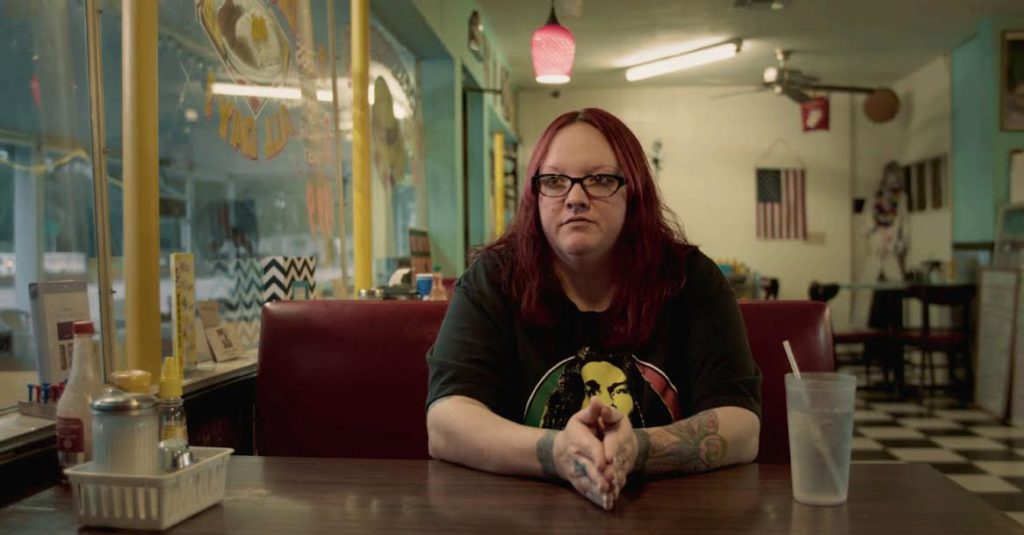Norwegian director Karen Winther made her feature directorial debut with “The Betrayal,” a personal documentary about her involvement in extremist groups as a teenager. The award-winning film premiered at IDFA 2011. “Exit: Leaving Extremism Behind” is her second feature.
“Exit” will premiere at the 2018 DOC NYC film festival on November 11.
W&H: Describe the film for us in your own words.
KW: “Exit” is a film exploring what can make violent extremists change. With far-right extremism spreading throughout the United States and around the world, the film is a personal and urgent examination of the ways radicalized people legitimize hate and how some, when confronted with the realization that everything they once firmly believed is wrong, are able to gather the courage to embark on extraordinary journeys to turn their lives around.
“Exit” tells the stories of a former left-wing extremist, far-right extremists, and a former jihadist — what made them enter these worlds as well as the threats they face when they attempt to leave those worlds behind.
W&H: What drew you to this story?
KW: I met with several former extremists and was surprised by how similar their stories were. It made me curious to investigate the de-radicalization and disengagement process further.
On a personal level, I was a member of extremists movements in Norway when I was a teenager, both left wing and far right. In 1996 I managed to leave and start a new life for myself. In this film, I was very interested in the parallels of my own past with the experiences of other former extremists to learn more about what makes someone join the far right, Jihadists, or other hate groups, and what makes them decide to leave.
W&H: What do you want people to think about when they are leaving the theater?
KW: Hopefully the film will make the audience look beyond the labels and get a deeper understanding of the long, hard process of leaving an extremist movement.
I want former extremists to know they are not alone and that it is possible to start a new life and there are great organizations — like Life After Hate and exit programs around the world — who are ready to help.
W&H: What was the biggest challenge in making the film?
KW: Finding people with experience from extremist groups who were willing to share their stories in front of the camera, especially women. A lot of formers live in hiding due to threats and they are afraid of being stigmatized. It took a long time to build up trust.
For me personally, it’s been a struggle to be more open about my past because I don’t like being labeled as a former extremist, when my life and my identity is so much more than what happened when I was 15 to 17 years old.
In the beginning it was also hard to convince financiers why I wanted former extremists with different backgrounds — why not just stick to one? We had to shoot and show them some material to convince them that seeing the similarities in the shared experience of all the characters is the core essence of the film.
W&H: How did you get your film funded? Share some insights into how you got the film made.
KW: The Norwegian Film Institute, regional film funds, the Nordic Film & TV Fund, and the Freedom of Expression Foundation in Norway [Fritt Ord] are some of the main financiers.
My producer, Eirin Gjørv, pitched at the Sheffield MeetMarket in the UK and the Nordic Forum in Sweden.
W&H: What inspired you to become a filmmaker?
KW: Watching Kim Longinotto’s films inspired me a lot. Her observational films made me feel like I was there in the moment. I’m impressed by Kim’s ability to find strong female characters and tell empowering stories about women: how she creates incredibly strong emotional scenes where the characters don’t seem to care about Kim’s presence, and she always manages to have a very low shooting ratio. I admire her ability to make herself invisible and the patience she has, waiting for the right moment to shoot. I would like to make a purely observational film like Kim’s someday, when I find the right subject for it.
W&H: What’s the best and worst advice you’ve received?
KW: Best: Kim Longinotto said I should not write detailed scripts before shooting and to trust my instinct.
Worst: My grandmother said I should make dessert for my husband every day to keep him happy.
W&H: What advice do you have for other female directors?
KW: Lift heavy weights, strengthen your core, and be strong. Filmmaking requires a lot of strength, both physically and mentally.
Find a passion outside of filmmaking. Roller derby does the trick for me. When I am on skates I can’t think about anything else, it helps clear my head and take my mind off work.
W&H: Name your favorite woman-directed film and why.
KW: Andrea Arnold’s “Fish Tank.” Her portrayal of the rebellious teenager Mia feels incredibly authentic and raw. It’s one of those films that stays with you. I still think about it sometimes, years after watching it.
W&H: Hollywood and the global film industry are in the midst of undergoing a major transformation. What differences have you noticed since the #MeToo and #TimesUp movements launched?
KW: Growing up, “The Breakfast Club” was one of my favorite films and meant a lot to my generation. Reading Molly Ringwald’s article in The New Yorker made me see the film in a whole new light. I was shocked to realize how women were portrayed in my favorite teenage comedies from the ’80s. How could we not see that at the time? The world has changed considerably.







